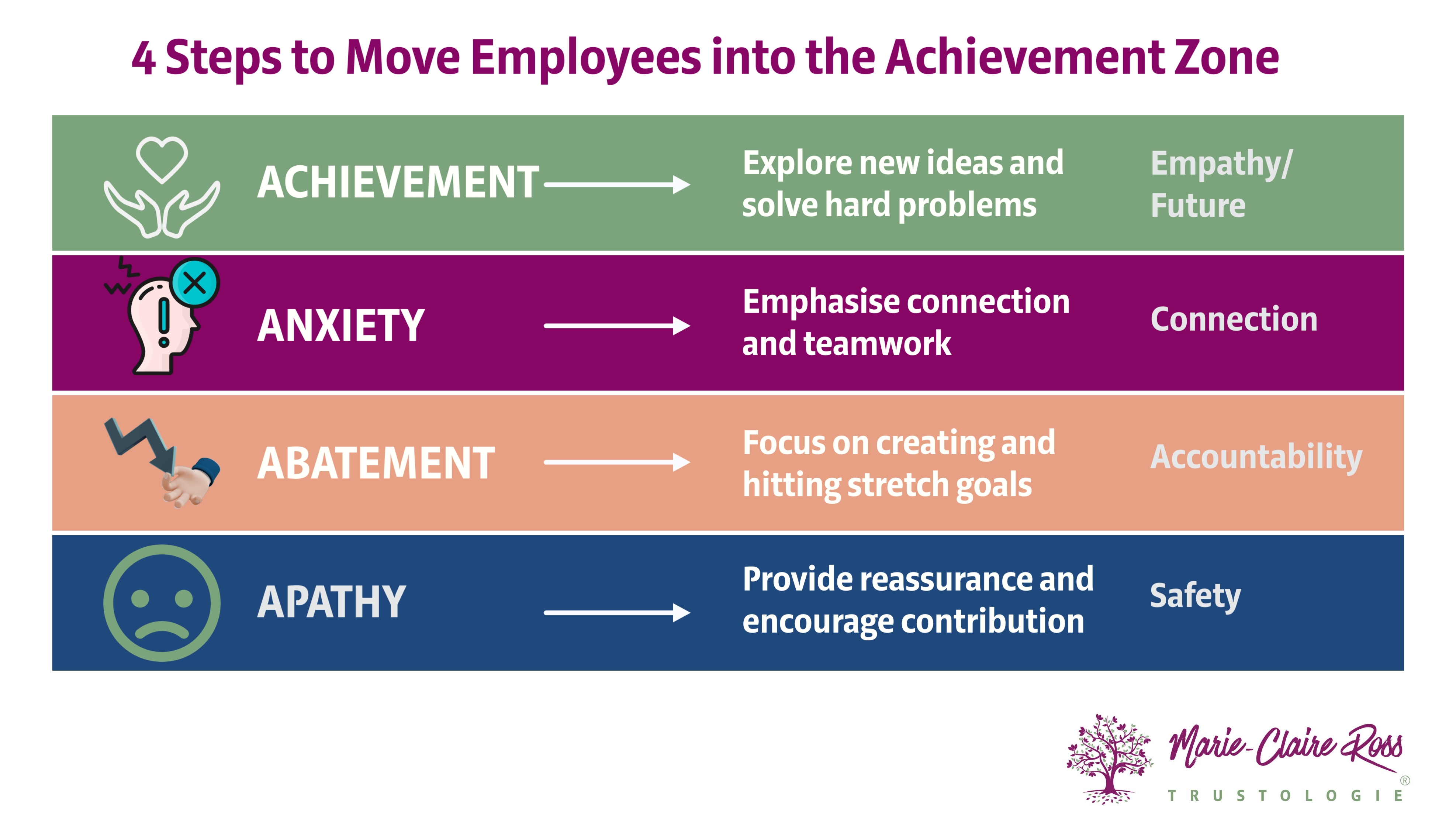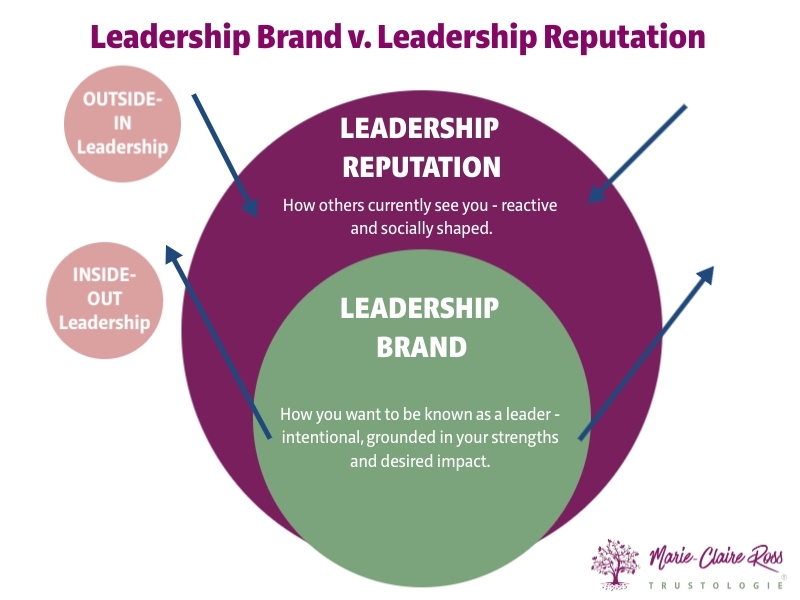13 min read
Is your team vibe feeling off? How to reset your team dynamics
As teams return from their summer (or winter) break, you may notice subtle shifts in your team’s energy. Even if the end of year was positive, a new...
Develop leaders, strengthen executive teams and gain deep insights with assessments designed to accelerate trust and performance.

Transform how your leaders think and perform with keynotes that spark connection, trust and high-performance cultures.

Explore practical tools, thought-leadership and resources to help you build trusted, high-performing teams.

Trustologie® is a leadership development consultancy founded by Marie-Claire Ross, specialising in helping executives and managers build high-trust, high-performing teams.

7 min read
Marie-Claire Ross : Updated on October 6, 2020

Today’s tricky business challenges requires leaders with increasingly sophisticated skills around fostering innovation, inspiring others, and collaboration. These competencies all require being able to build trust first.
When employees trust management and the organisation they are more likely to exchange ideas and information, discuss difficult issues and find ways to create synergy. But if people don’t trust, they close down. It means they won’t contribute to meetings, co-operate, or try anything new.
The relationship between a manager and an employee is the single most important predictor of employee engagement. People are more likely to leave their job because of their boss than any other reason.
Employees will trust their manager based on how they make them feel. That’s because the brain processes trust in the subconscious brain that has no capacity for language. As a smart and capable leader, how do you ensure that people feel that interacting with you is a place of reward and not risk? How can you make people feel that you will do the right thing by them?
Here are the top seven mistakes to avoid to ensure that your colleagues start to feel that they can’t trust you.
“Me, I’m dishonest, and you can always trust a dishonest man to be dishonest. Honestly, it’s the honest ones you have to watch out for.” – Captain Jack Sparrow (not a real person)
We are biologically programmed to look out at the world and determine whether we can trust those around us. But we aren’t designed to look at ourselves to see whether we are behaving in a trustworthy manner.
We often act in ways where other people misinterpret our motives or we are not aware of the negative impact of our actions.
High trust leaders intentionally build trust and regularly reflect on their building trust efforts. They have the self-awareness to not only review when they are at fault, but to admit it and make amends. They understand that their actions and words can inadvertently communicate a lack of trust. A typical example is how you periodically check-in on a project. Depending upon your words, facial expressions, and body posture, this can be interpreted as not trusting people to complete work independently or supporting people to do their best work. A high trust leader keeps this in mind.
Low trust leaders tend to make a lot of assumptions about people and themselves. They often assume people know that they trust them in the workplace. The reality is direct reports need to hear that they are doing a good job and frequently. Making assumptions about what people think comes across as a blatant lack of self-awareness that really frustrates others.
To avoid this, check in with often people to ask them what they think and what information they need from you. Take time out to regularly self-reflect on your own actions and words. Consider how are you demonstrating that you are confident in people’s abilities? How do you let people know they are doing a good job? How do your words and deeds convey your level of trust? Do you give your employees an opportunity to make decisions on the things that impact them the most in their job? How do you react when they make a mistake?
“Trust men and they will be true to you; treat them greatly and they will show themselves great.” Ralph Waldo Emerson
Often, leaders will tell me that “trust must be earned.” While that is true to some extent, it’s critical to trust people initially rather than holding back from trusting others until they reach a particular milestone. Starting a relationship by withholding trust is extremely damaging.
According to experiments undertaken by Dr. Paul Zak, when someone is tangibly trusted by a stranger, the brain synthesizes the signaling chemical oxytocin. Oxytocin is the hormone that underlies trust and makes us more empathetic. The more trust one is shown, the more the brain produces oxytocin. When we trust the people around us and the people we are with, we are more likely to cooperate and forgive past transgressions.
Trust begets oxytocin, which begets trustworthiness in return.
In other words, we only trust people who trust us. We don’t trust people who don’t trust us. It’s how our brains work. Think of oxytocin as the biological basis for the golden rule: If you treat me nicely, my brain makes oxytocin which signals you’re a person whom I want to be around, so I treat you well in return.
To ensure your direct reports and peers trust you, start by trusting them first and demonstrate it. Never assume that people trust you because you get along with them or because they have never said anything. Being liked and being trusted are two different things. The reality is we trust each individual dependent upon the situation and their consistent capabilities in that area. Not necessarily because we like them.
“Be very good at what you do. Competence is a litmus test.” Nan Russell
Trust involves an assessment of how comfortable we are with relying on someone. In the workplace, a judgment of simple competence can be critical. We are only trustworthy to the extent that we can capably fulfill a given responsibility. And it’s on three levels – delivering on time, on budget and to quality specifications.
Unfortunately, some leaders believe that meeting one or two of the conditions are enough thinking that constant time pressures are a plausible excuse. However, they don’t realise how it damages how people see them.
When employees don’t feel their leader is competent enough to guide them because they doubt their ability or notice other leaders don’t trust their ability, they are unlikely to commit and feel inspired to an exciting new vision.
Avoid overpromising and underdelivering or making excuses for sub-standard work. All this does is reduce trust with other peers and teams. In some cases, it often means the CEO doesn’t trust the leader to lead their team successfully and execute on strategy.
On the other hand, leaders that are solely focused on a “bottom line” mentality, also reduce trust. Pressure to reach performance targets and control costs sometimes cause managers to be more focused on results than people. This type of thinking often comes at the expense of other priorities, such as building relationships and enabling employees to make autonomous decisions.
“Ability is a wonderful thing, but its value is greatly enhanced by dependability. Ability implies repeatability and accountability.” Robert A. Heinlein
Of course, being competent does not build trust if you are unreliable. To be able to be trusted, people need to be able to confidently predict, based on your promises and track record, what you will do. In other words, following through on your commitments again and again.
It might sound trite, but delivering reliable results repeatedly is a powerful leadership behaviour. Even for CEOs.
According to research by Elena Botelho, a partner at Chicago-based leadership advisory firm ghSmart, “Demonstrating reliability doubles your chances at getting the top job, and it improves your odds of success in the top job, by [approximately] 15 times.” Boards and investors love a steady hand, and employees trust predictable leaders.
If you or someone on your team has reduced trust by missing a deadline, acknowledge the faux pas and talk about what can be done to fix it. Work out what to do to ensure it doesn’t get repeated. Make sure you set realistic expectations and get clear on the deliverables required. Taking on tasks with energy and enthusiasm will provide those around you with the confidence they need that you will see through your responsibilities.
“You fail all the time, but you aren’t a failure until you start blaming someone else.” Burn Phillips
Accountability is tied to promises. Leaders that make excuses for substandard work, not only reduce trust with other departments but send the message to their own team that under-performing is satisfactory. The end result that it is really difficult to improve performance when everyone is used to submitting half-arsed work and avoiding accountability.
To build trust, it’s critical that leaders are responsible for their team results – holding themselves and others accountable.
“It takes twenty years to build a reputation and five minutes to ruin it.” Warren Buffett
Credibility is the degree to which your colleagues believe in what you say about a particular subject. It’s demonstrated through your experience and a proven track record of achieving results.
A Harvard Business Review article reveals that employees like to know that their bosses can do their jobs as well as they can and that they have technical competencies that extend beyond their own.
If you lack credibility as a leader, it can be difficult to build trust within your team. Employees are more comfortable with leaders who are knowledgeable about their industry, process or product because it conveys that you know what you’re talking about. It means they know they can turn to you for advice and be more likely to embrace your feedback, decisions and even constructive criticism.
Frontline employees are notorious for deciding whether to trust a leader based on whether they have ever worked behind the counter or fulfilled orders on the factory floor. Even sales teams want to know that their new sales manager has industry experience.
To increase your credibility, provide lunchtime workshops, that not only demonstrate and share your expertise but increase your team’s knowledge and abilities. Avoid exaggeration, admit when you don’t know something, consult with others for an expert opinion and offer to help find a solution. But most importantly of all, spend time on the front line.
“Fairness does not mean everyone gets the same. Fairness means everyone gets what they need.” Rick Riordan
One of the biggest determinants of trust is whether you are perceived as fair. Unfortunately, there is no objective measure of fairness. What might be fair to one person is unfair to another.
Ultimately, what people want to know is that there is a transparent and equitable decision process for everyone to be able to achieve in the workplace. For example, can people understand and easily achieve the steps required to get a promotion? Or is it a bit random or too tough to achieve? When people perceive favouritism or a random decision that can thwart their career opportunities, they are least likely to trust their leader.
To avoid this, make sure your decision-making process consults all stakeholders, factors, and openly communicates the evaluation you took to arrive at the decision. People are more willing to accept a decision they do not agree with if they believe their opinion has been heard.
Trust is about the future and people’s ability to predict what you will do and whether they can depend on you. People will make the decision to trust your leadership based on whether you follow-up on your promises, act confidently and hold yourself and other people to account.
Furthermore, it is about how you make them feel. Are you for them or against them? Are you only for you, your best buddies or everyone?
No matter how you slice it, being a leader is all about getting people to do their best work. By reviewing how you perform in these seven blind spots, even asking for honest feedback, is the first step to creating an environment where people feel psychologically safe around you and are willing to join your crusade and go above and beyond their role.
If you want to learn more about behaviours that can unintentionally sabotage your results, register for the complimentary webinar – Next-Gen Leadership: 3 Steps to Build Trust More Efficiently.

13 min read
As teams return from their summer (or winter) break, you may notice subtle shifts in your team’s energy. Even if the end of year was positive, a new...

14 min read
The workplace is evolving at a pace few previous generations have seen and 2026 will mark a turning point. The Future of Work is blended, not hybrid....

5 min read
Many leaders jump into a leadership position excited by the opportunity to help others and perform at a higher level.

Why is that successful and well-managed companies struggle with change and disruptive innovation? Too often, what got companies to where they are...

In the pressure cooker business world we live in, change and uncertainty have become commonplace. No longer can organisations rest on their laurels....

Today's complex, fast-changing world features speed, complexity and dense interdependencies. Problem solving in real time and focusing on continuous...